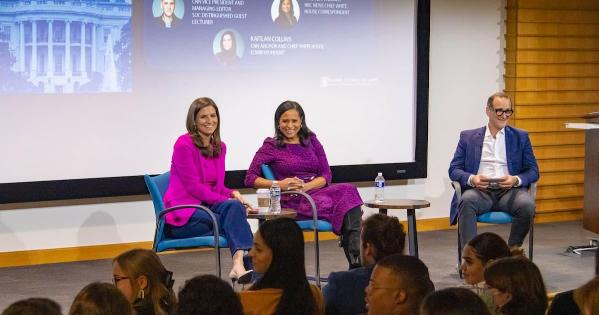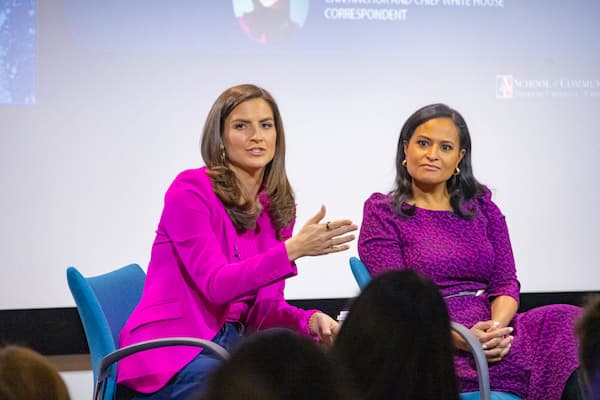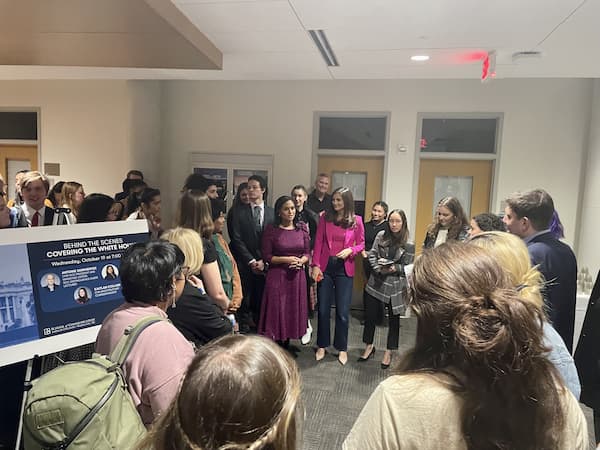White House Correspondents and Anchors Pull Back Curtain to Coverage

With years of experience in the White House press corps under their belts, NBC’s Kristen Welker and CNN’s Kaitlan Collins have a bit in common.
The bond was evident at a recent American University School of Communication (AU SOC) panel discussion on what work is like behind the scenes at the White House, moderated by Antoine Sanfuentes, CNN vice president and managing editor for CNN’s White House and Capitol Hill coverage.
"Are you competitive or collegial at the White House?" Sanfuentes, an AU alum, asked the correspondents.
"Collegial," said Collins as Welker at the same time said, "both."
As they laughed, Collins elaborated.
"People are always shocked that it’s not like knives out in the press corps," she said.
The event, sponsored by the SOC, its Journalism Division and the Kennedy Political Union, was more than a year in the planning. Sanfuentes brought the correspondents to SOC in his role as SOC Distinguished Guest Lecturer. The panel originally had been scheduled for last March was cancelled the day before when the panelists had to suddenly fly to cover an historic NATO summit on the then-new war in Ukraine.
Both said their camaraderie was forged by crawling "through the trenches together" as journalists and working in tiny booths at the White House. They traded comments on how to prepare for the job, how to avoid spin, and how to handle pushback when traveling to countries that do not enjoy freedom of the press.
A video montage kickstarted the event, showing Collins questioning President Joe Biden at a summit in Geneva and Welker’s moderation of the U.S. Presidential Debate in 2020 between Biden and Donald Trump. Neither looked easy. Welker was widely applauded for how she handled the debate.
Welker has been the NBC Chief White House correspondent since December 2011 and co-anchor of NBC’s Weekend TODAY.
Collins began her career covering the White House at the Daily Caller in 2017 before moving later to CNN. Collins was recently announced as one of the three hosts of 'CNN This Morning,' a new show set to debut on Nov. 1.
Over the hour, the conversation was wide-ranging. The correspondents talked about their experience as journalists in Washington, D.C.; how they deal with distrust of the media, and the evolving diversity of the White House press corps.
Currently, ABC, CBS, NBC and CNN have women leading their coverage of the White House. But it wasn’t an easy path. Welker described an experience earlier in her career where a colleague referred to her as the person who got hired in the "Black position."
Since then, things evolved. "I think that when I first got there, it wasn't even conscious. I did feel like I was really one of the very few women, women of color in the briefing room," said Welker of the White House. "And there's a sense of pride and also feeling a little bit more empowered, because there are more women and more women of color who have this role."
 Kaitlan Collins and Kristen Welker answer student questions Kaitlan Collins and Kristen Welker answer student questions |
Collins also saw change. "I don't even know if we realized it until someone pointed it out to all of us," said Collins about female reporters leading the White House coverage on four major networks. "And that was really cool."
The journalists agreed on something else: the only way to persevere is to be prepared. If you know your stuff, then you can avoid the inevitable spin.
"The preparation to cover the White House requires a lot of research, talking to a lot of different people here in Washington, both inside 1600 Pennsylvania Avenue, but more importantly, outside to get different perspectives," said Welker.
Collins agreed about preparation.
"He (former President Donald Trump) would have moments where he could try to push back or undermine you, or make you look like you didn’t know what you were talking about to, you know, chip away at your credibility as a reporter. And my number one goal was to never let that happen," said Collins. "And so, I read anything and everything and studied really hard. You’re not done studying once you’re done with school."
Collins said that the Trump years also reset all the press corps rules and norms.
"It changed all these things that if you've been covering the White House for forever, or for five minutes, like me, it was really kind of just an even playing field to go out there and work your butt off and try really hard and report and write stories and you can make a path here," she said.
'Know the monolith'
Welker reinforced the notion of staying true to the basics of journalism with an anecdote from her first on-air job in Redding, California. She was sent on an assignment to cover an historic site with architectural remains of what locally was called the Monolith. Welker recalled returning to the newsroom with footage only to have her editor ask what a monolith actually was. She didn’t have an answer and it made her story incomplete.
The Monolith was part of a conveyor carrying gravel to build Shasta Dam. That was why it was important to the community. It later became an art installation.
"My advice to all of you is always know what the monolith is," Welker joked. "If you put a story on air because if you are confused about something, the viewer will be, too."
In the current tense political and media landscape, the journalists also emphasized the challenge of maintaining the media’s credibility and ensuring accuracy while gaining trust.
"But that is a big part of what we do here, covering the White House and for Capitol Hill correspondents as well, is gaining trust, earning trust and figuring out who you can trust," said Welker. "And I think that that's one of the most important pieces of this and staying true to your word when you have a conversation."
For an audience of primarily students, Collins and Welker also offered words of advice.
"You don’t have to know everything on day one; there’s a level of humility about not knowing everything. What’s important is what you do with the opportunity that you get and that you take it and you run with it," Collins said.
Welker offered her dad’s words instead – "The only way to not make a mistake is to not do anything."
 Kristen Welker and Kaitlan Collins talking with students after the event Kristen Welker and Kaitlan Collins talking with students after the event |
Reactions from students:
"I watched the U.S. Presidential Debate in 2020 on my couch in college. And fast forward roughly two years, and Kristen Welker is 10 feet away from me," said Olivia Diaz, a journalism graduate student.
"That’s certainly something that’s going to stick with me is the fact that it doesn’t just happen overnight. It takes a lot of hard work," Hayden Godfrey, also a journalism graduate student said.
